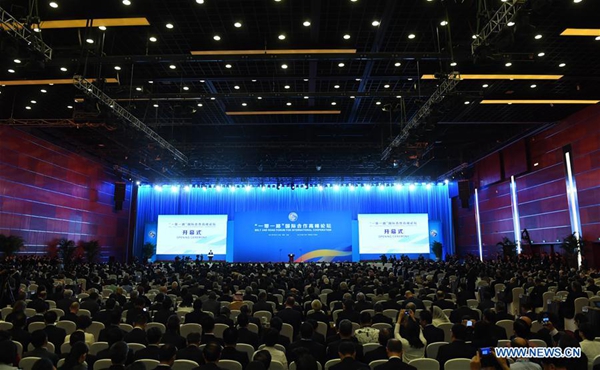All roads lead to Beijing
- By Bishnu Hari Nepal
 0 Comment(s)
0 Comment(s) Print
Print E-mail China.org.cn, May 14, 2017
E-mail China.org.cn, May 14, 2017
|
|
| The opening ceremony of the Belt and Road Forum (BRF) for International Cooperation is held in Beijing, capital of China, May 14, 2017. (Xinhua/Zhang Duo) |
The Belt and Road Initiative (BRI), promulgated by President Xi Jinping in 2013, has attained a new height in the international arena offering multi-dimensional paradigm shifts from the Cold War or post-War period to the contemporary development strategies joining Asia to the outer world.
The Western proverb on connectivity "All Roads Lead to Rome" has been outdated today. Present day reality is "All Roads Lead to Beijing" at the China National Convention Center and Yanqi Lake International Center for the Belt and Road Forum for International Cooperation (BRF) on May 14-15, 2017. The motto of the BRF "Boosting Cooperation and Realizing Development" tallies to Xi's vision of working together to forge a new partnership of "win-win-cooperation" and create a "community of shared future for mankind."
It's Xi who, in his first address to the UN General Assembly on September 28, 2015, declared, "We must translate commitments into actions and work together to ensure that everyone is free from want, has access to development and lives with dignity. "
As a matter of fact, the Xi-era in China has proved that Beijing is ready to share its development experience and opportunities with other countries and welcome them to board "China's Express Train of Development" so that all citizens of the world achieve fruits of common development. Here is what the author means by the "paradigm shift" in the Cold War or post-War mentality in the decision making systems of the "World Order" and Game Theory.
Organizing the biggest global event of the year in Beijing, China has kept its promise to support the UN SDG 2015-2030 with some 1,500 participants. The "connectivity and cooperation" are the necessary tools for the SDG strategies. The high level participation of the UN, World Bank, IMF, ADB and 60 more global organizations represented by 29 heads of states and governments and more than 130 countries from the global map strongly indicate that the BRI is the pillar of the UN-led SDG strategies, which is declared to be for all: weak or strong and big or small countries.
This author, as a theorist and practitioner, takes pleasure in suggesting that the BRI should focus on multi-dimensional paradigms based on trade, tourism, transportation, transfer-of-technology, and hydropower/clean-energy generation. Among the variables, "transfer of technology" should consist of human resources management, agricultural development, social-development sectors like education and health, infrastructural development, environment conservation, investment promotions, industrial growth and more.
The connectivity part of the BRI is, of course, well known. The New Silk Road connecting Asia to Europe and the 21st Century Maritime Silk Route joining East Asia to ASEAN, SAARC, Indian Ocean, Africa and Europe. Therefore, the connectivity strategy of transportation should cover all of its forms -- road, navigation and aviation.
To the point of urbanization and the connectivity, the world could learn from Shanghai, which was just ranked the "first" in rail-mileage as a "Global City" hosting over 1,300 trans-national corporations and organizations and functioning as an international center for innovation, trading, pricing and settlement. Annual trade volumes to Shanghai totals US$188trn and the turnover of exports and imports stands at more than US$1 trillion.
Dr. Bishnu Hari Nepal is a theorist and practitioner in international relations, peace, conflict, security and development studies.
Opinion articles reflect the views of their authors, not necessarily those of China.org.cn.







Go to Forum >>0 Comment(s)